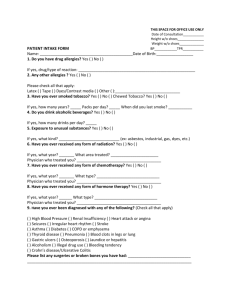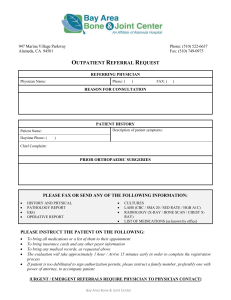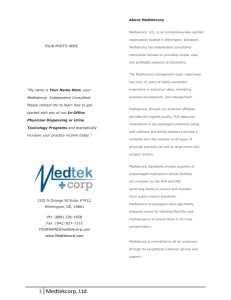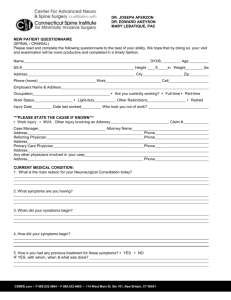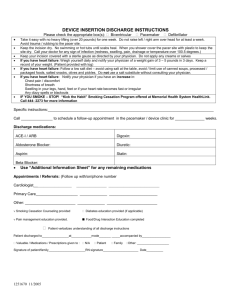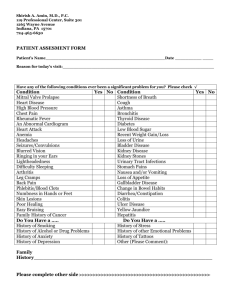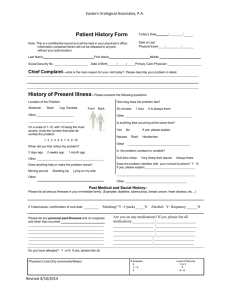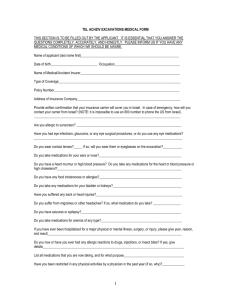Complex Care Plan Template
advertisement
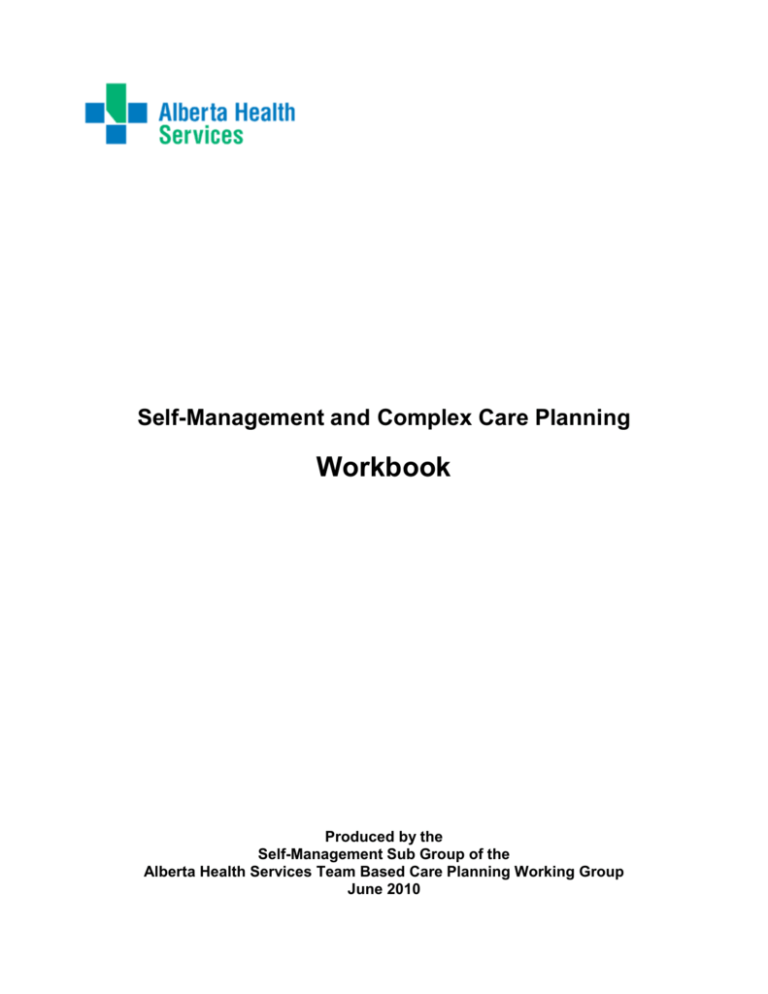
Self-Management and Complex Care Planning Workbook Produced by the Self-Management Sub Group of the Alberta Health Services Team Based Care Planning Working Group June 2010 Objectives The care planning process document: 1. describes a process that will enhance the collaborative nature of the care planning process 2. provides sample interview questions that will facilitate patient involvement in completing the Comprehensive Care Plan document (03.04J) 3. supports the health care provider to evoke and enhance the patient’s intrinsic motivation to change health behaviours, and to strengthen the patient’s commitment to adhere to the treatment plan 4. provides an opportunity for health care providers to enhance their skills in patientcentred care Doing care planning collaboratively is important because it: o o o o enhances patient motivation to make changes increases patient adherence to their care plan involves patients in decision making has the provider act as a coach and a guide Motivational Interviewing Approach Mirror Opposite Approach Partnership between two experts One expert provider who knows what is best for the patient Strength-based assumes that Deficit-based assumes that o the patient has the resources and motivation to make changes, o and the provider’s job is to draw them out. Autonomy o provider affirms the patient’s right and capacity for self-direction and choice o the patient makes decisions; o is patient-centred o the client lacks key knowledge, insight or skills necessary for change to occur, and o the provider must give them to the patient. Authority o the provider tells the patient what he must do o the provider makes decisions o is healthcare provider-centred Complex Care Plan Template (03.04J) Patient: (Affix Label) Date: ____________________ Diagnoses: “Complex” patient means multiple complex health needs including chronic disease and other complications. The patient must have at least two diagnoses from Group A OR at least one from Group A and one from Group B. GROUP A GROUP B Hypertensive disease (401) Diabetes Mellitus (250) COPD (496) Asthma (493) Heart Failure (428) Ischaemic Health Disease (413-414) Mental Health (290-319) Obesity(278) Addictions (303-304) Tobacco (305.1) Much of this information will come from the medical record; however you will want to involve the patient in the discussion by asking questions such as: “Tell me about the health conditions that you have…” ______________________________________________________________________________________________ ______________________________________________________________________________________________ ______________________________________________________________________________________________ “What do you know about your <health conditions>…?” ______________________________________________________________________________________________ ______________________________________________________________________________________________ ______________________________________________________________________________________________ What might happen to you if you do not keep your <health condition> under control? ______________________________________________________________________________________________ ______________________________________________________________________________________________ ______________________________________________________________________________________________ Part 1: History (Note: if the required information already exists in another format, the physician may attach a hard copy instead of completing the required fields. The form must still include appropriate signatures.) Problem List: (allergies, medical conditions, important medical history, barriers, problems etc.) 1. 5. 2. 6. 3. 7. 4. 8. Much of this information will come from the medical record. Patients who feel they have been heard and understood are more likely to take ownership of their care plan and follow it. Invite the patient to tell you their story by using questions such as: What other concerns or health conditions do you have? ___________________________________________________________________________________________ ___________________________________________________________________________________________ ___________________________________________________________________________________________ What prevents you from making or attending your medical appointments? ___________________________________________________________________________________________ ___________________________________________________________________________________________ ___________________________________________________________________________________________ How comfortable are you talking with your doctor / nurse about your medical conditions? ___________________________________________________________________________________________ ___________________________________________________________________________________________ ___________________________________________________________________________________________ Tell me about the symptoms you experience / how you keep track of them / how you manage them. ___________________________________________________________________________________________ ___________________________________________________________________________________________ ___________________________________________________________________________________________ Lifestyle issues and other relevant information Caffeine No Yes Daily Consumption ____________________________________ Smoking No Yes Pack/Years __________________________________________ Alcohol No Yes Consumption (day/wk/mo.) _____________________________ Recreational Drugs No Yes Specifics ____________________________________________ Physical Activity No Yes Specifics ____________________________________________ Other No Yes Specifics ____________________________________________ *Be cautious: asking close-ended questions that are inherently judgmental in nature can generate resistance on the part of the patient, and may discourage patients from engaging in a forthright discussion of risk behaviours. Discussions about engaging in risk behaviours can be facilitated by: 1. starting your discussion with a normalizing statement prior to asking about specific behaviours: All of us at some time or another do things that aren’t good for us. It might be something like not wearing a seatbelt, or perhaps drinking more than we should… What behaviours have you been doing that might put you at risk? ___________________________________________________________________________________________ ___________________________________________________________________________________________ ___________________________________________________________________________________________ OR 2. beginning the discussion by inviting patients to tell you what positive things they are already doing. What do you do to keep yourself as healthy as possible? ___________________________________________________________________________________________ ___________________________________________________________________________________________ ___________________________________________________________________________________________ Once you have acknowledged, congratulated and affirmed their actions (building self-efficacy), move on to discover current issues by asking: What things do you do that could make your health worse? ___________________________________________________________________________________________ ___________________________________________________________________________________________ ___________________________________________________________________________________________ Current Medications Medication Problem Dosage By engaging your patient in a conversation about their medications, and why and how they take them, you will gain insight into whether they are willing and able to take their medications in the most effective way. Tell me how and why you take your medications ___________________________________________________________________________________________ ___________________________________________________________________________________________ ___________________________________________________________________________________________ What are some other treatments that you are using now, or have tried in the past? ___________________________________________________________________________________________ ___________________________________________________________________________________________ ___________________________________________________________________________________________ What side effects have you experienced from taking your medications? ___________________________________________________________________________________________ ___________________________________________________________________________________________ ___________________________________________________________________________________________ Many patients have problems taking their medications – perhaps they cost too much, or it is hard to remember to take them on time. What problems have you had with taking your medications? ___________________________________________________________________________________________ ___________________________________________________________________________________________ ___________________________________________________________________________________________ Before completing the interventions section of the care plan, it is necessary to identify which issues need to be addressed. Although the health care provider will know which medical issues need attention, the patient’s commitment to follow the care plan will depend on their level of involvement in negotiating how these issues are prioritized on the care plan. This is accomplished by 1) having the patient do a self-assessment of how well they are doing in managing their condition 2) having the provider assess how well the patient is managing, based on what the patient has told them, and on what the medical indicators show 3) having both parties negotiate which items will be dealt with, in what order, when, and what support will be provided to the patient by each member of the health care team. PATIENT ASSESSMENT OF SELF-MANAGEMENT Give your patients an opportunity to assess how well they are self-managing by having them answer the following questions. This can be done by handing them the questions to write out an answer, or by asking the questions in an open-ended and non-judgmental way. How well do you understand your health condition(s) and treatment(s)? __________________________________ ___________________________________________________________________________________________ How well do you keep track of and respond to changes in your symptoms? _______________________________ ___________________________________________________________________________________________ How well do you communicate with your family and your health care providers about your health condition? _____ ___________________________________________________________________________________________ How does your health condition change your life -- physically? emotionally? socially? _______________________ ___________________________________________________________________________________________ ___________________________________________________________________________________________ ___________________________________________________________________________________________ How healthy is your lifestyle -- healthy eating? physical activity? stress management? Is there anything you would like to change about your lifestyle? ___________________________________________________________________________________________ ___________________________________________________________________________________________ ___________________________________________________________________________________________ PROVIDER ASSESSMENT OF ISSUES After the patient has completed the self-assessment, have a discussion about these questions with the patient and do your own assessment of how well the patient is managing in these key areas. Based on that discussion and the clinical information in the patient’s medical record, you are now be ready to negotiate with the patient about which of these areas should go onto the care plan. The two of you must agree on which issues the patient and the health care team can work on together to achieve better outcomes. NOTE: There may be issues that the provider feels are important to address but that the patient is not willing to commit to right now. If that is the case, ask the patient’s permission to list them on the care plan to be dealt with at a future time, whenever the patient is ready. Re-visit those parts of the care plan during each care plan review. MUTUALLY AGREED UPON IDENTIFIED ISSUES Issue Intervention Encourage patients to choose which target behaviours to work on first. This will strengthen patients’ commitment to take action. They are most likely to choose those issues that they are most convinced are important, that they are most confident that they are capable of doing, and which are therefore the issues where they are most ready to take action to make a change. Therapies/Interventions Therapies/Interventions # Per Year Scheduled services are to be shown under respective months listed below Jan Feb Mar Apr May Jun Jul Aug Sep Oct Nov Dec Involvement of Health Care Professionals Professional Specialist Pharmacist Dietician Nurse Physician Assistant Psychologist Social Worker Other Active or Planned A or P Contact Information (If available) Additional Information (roles, goal linkages, next appointment, etc.) End of Life / Advance Care Planning discussed: Yes No N/A If yes, provide details __________________________________________________________________________________________ __________________________________________________________________________________________ Part 2: Goals Must be clearly defined and agreed upon between the patient and/or the patient’s agent and the physician. This section is to be completed by the patient in partnership with the physician and/or care team. May include concerns about medical conditions, problems, barriers or next steps, and are followed by action, solutions, observations, the current status of the goals and expected outcomes, etc. Goal Action Who is Responsible Expected Outcome Result It may be helpful to begin this discussion by first having the patient define what their overarching goal for their health is. This may be stated in the form of a “medium to long-term life goal”. People have many different reasons for wanting to stay as healthy as possible. It may be that they are looking forward to golfing in their retirement, watching their grand children grow up, staying well enough to travel… Tell me why it is important to you that you manage your health well. What things would you like to be able to do regularly, that your health problems are keeping you from doing now? ___________________________________________________________________________________________ ___________________________________________________________________________________________ Sub-Goals: What things will you have to do, to achieve your life goal? Examples might be, get my diabetes under control so I don’t get any complications, stop smoking to prevent my COPD from getting worse, manage my pain meds well so I can think clearly and still function well ___________________________________________________________________________________________ ___________________________________________________________________________________________ ___________________________________________________________________________________________ Action Plans: What would you like to focus on first, to get you started on achieving that goal? For example, if the goal is to control your diabetes, your action plan might be to see the dietitian about healthy eating, have a medication review with the pharmacist, increase physical activity by walking the kids to school in the morning…. Action plans should be SMART: specific, measurable, achievable, rewarding and timely. What I will do:_______________________________________________________________________________ How much I will do:___________________________________________________________________________ When I will do it :_____________________________________________________________________________ How many times I will do it before we meet again:_________________________________________________ “Rolling With Resistance” You may find that the patient offers resistance to the care planning process at some point. Resistance is a product of the relationship between the provider and the patient. There are things that providers can do to decrease resistance: o o o o listen attentively clarify using reflective listening express empathy strengthen self-efficacy and things we can do which increase it: o o o o o be directive or prescriptive argue for change shame warn disagree with the patient Think of resistance as a signal for the provider to listen more carefully, slow down, proceed with caution, or stop going in that direction. The interaction between provider and patient should feel like “dancing” not like “wrestling”. Declaration We (the physician and patient/patient agent) have discussed this care plan and the patient/patient agent has received a written copy of it. A similar document has not been completed with another physician in the past twelve months. _________________________ Patient &/or Agent (please print) __________________________ Signature _________________________ Date _________________________ Physician Name(please print) __________________________ Signature _________________________ Date Adapted from:
